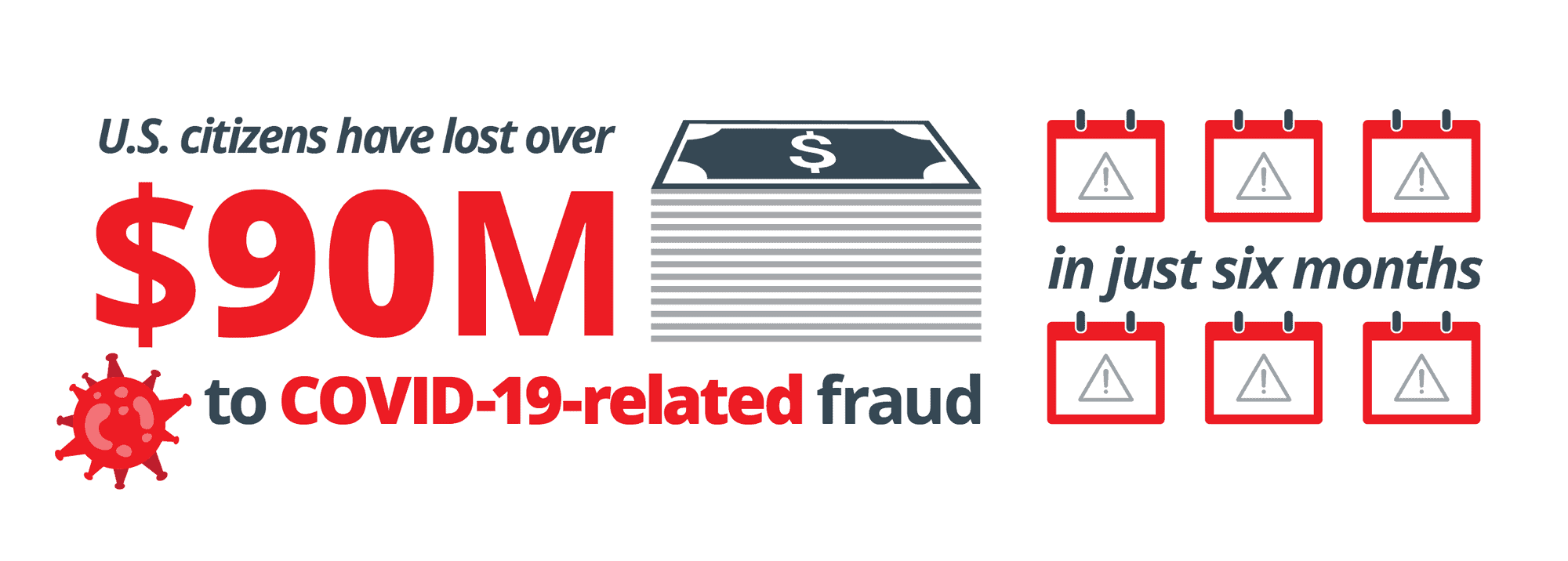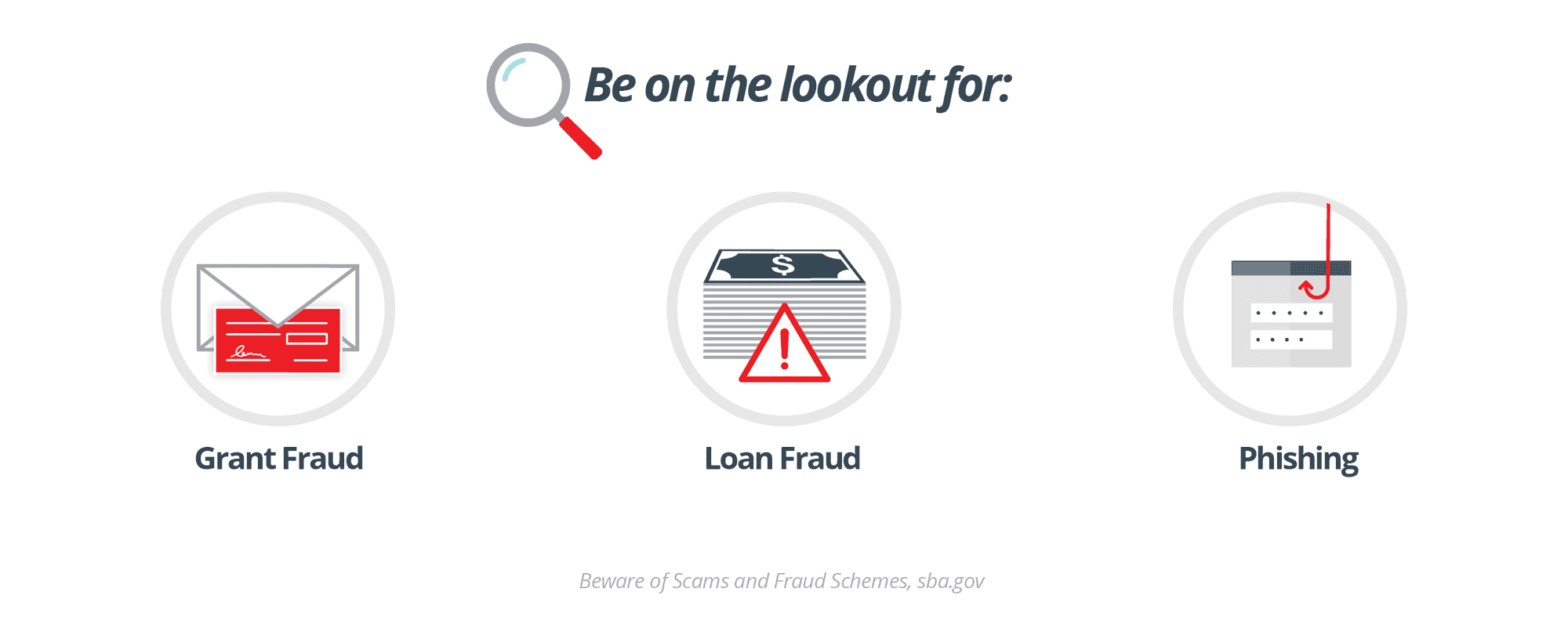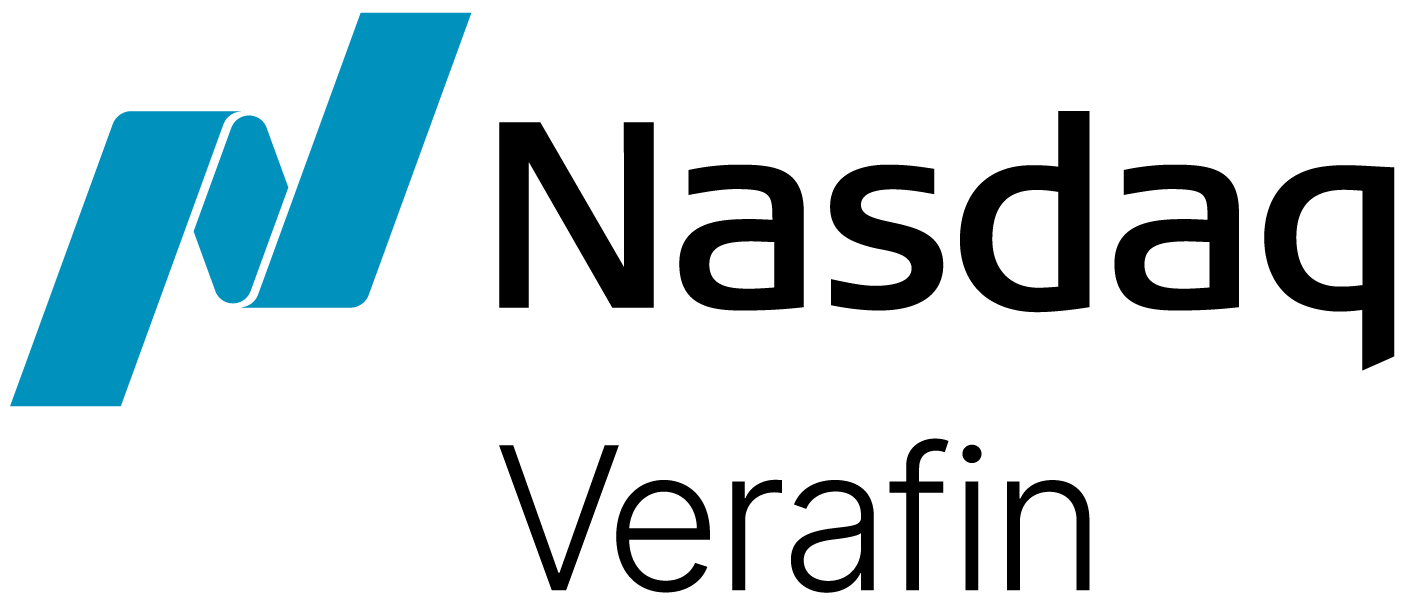
“While American small business owners and employees are struggling, fraudsters are busy trying to steal the money meant to help those families survive. With billions of dollars in aid available, they will try every trick in the book to rob the rightful recipients of those funds.”
John Strong, FBI Special Agent in Charge
Amidst the COVID-19 crisis, a strained economy and record unemployment, fraudsters are continuing to prey on hardworking Americans with endless scams. U.S. citizens have lost over $90 million dollars to COVID-19-related fraud in just six months — a potentially conservative figure given prevalent schemes exploiting Coronavirus Aid, Relief, and Economic Security (CARES) initiatives. From economic stimulus payments to unemployment benefits, criminals have widely profited from pandemic aid, and U.S. Small Business Administration (SBA) loans are their latest targets. With the SBA warning their programs are not immune to attack and the threat against other CARES aid ongoing, financial institutions must establish robust controls to protect customers and prevent losses.

Stimulus Payments, Unemployment Benefits Aggressively Targeted
From the outset of the CARES act in March 2020, the Pandemic Response Accountability Committee warned that relief funds represented “unmatched prospects for fraud, misuse of the funds, and other criminal conduct.” By May, this prediction had come to pass as billions of dollars came under threat from fraudsters siphoning economic stimulus funds using counterfeit checks and compromised automatic payments. Well aware of the suffering U.S. labor market and soaring unemployment, fraudsters also targeted state unemployment programs, diverting millions of dollars with fraudulent claims filed using stolen personally identifiable information (PII). With unprecedented opportunities for fraud and historic volumes of aid at risk, decisive action against criminals targeting CARES aid is essential.
Decisive Action Against Fraud
Verafin has always recognized that it is essential to provide financial institutions with solutions that scale quickly and provide protection against the financial and reputational damage of fraud at the earliest opportunity. By analyzing over a billion transactions in the Cloud with cross-institutional analysis and machine learning technology, our development team quickly developed analytical agents to detect COVID-19-Related Stolen Stimulus Payments and COVID-19-Related Unemployment Benefit Fraud as these crimes emerged. Through our customer-driven development process, Verafin collaborated with financial institutions to rapidly develop these new behavior-based analytical agents and released new functionality within weeks, keeping our customers ahead of the frenetic pace of COVID-19-related fraud.
Fraudsters Target SBA Loans
“Increased loan volume, loan amounts, and expedited loan processing timeframes may make it more difficult for SBA to identify red flags in loan applications. Without sufficient controls in place, SBA programs suffer increased vulnerability to fraud and unnecessary losses when SBA and its lending partners expedite loan transactions to provide quick relief.”
Pandemic Response Accountability Committee Report
The SBA is responsible for supporting small businesses during the COVID-19 crisis with programs funded by the CARES act, including the Paycheck Protection Program (PPP), Economic Injury Disaster Loan (EIDL), SBA Express Bridge Loans and SBA Debt Relief. While these initiatives are intended to provide businesses with economic reprieve, their size and speed of delivery have made SBA loans prime targets for criminals eager to profit from the billions of dollars in relief funds available. The SBA has warned that “fraudsters have already begun targeting small business owners during these economically difficult times” and urged Americans to “be on the lookout for grant fraud, loan fraud, and phishing.” In a recent report to the SBA, the Inspector General has identified “serious concerns” regarding the EIDL program, including $250 million in economic injury loans and advance grants for potentially ineligible recipients, $45.6 million in potentially duplicate payments, and fraud rings targeting funds through romance scams and other fraud schemes. Meanwhile, the U.S. Department of Justice continues to unseal multimillion-dollar cases of loan fraud targeting other SBA programs.

In line with these warnings, our customer partners have reported SBA payments with mismatched payee and account holder names, or a business name as the payee for SBA payments destined for an individual’s account. These discrepancies may indicate an account is under criminal control or is owned by a money mule who will wittingly or unwittingly forward the illicit deposits to the fraudster. The Office of Inspector General has also identified red flags, such as loan applications filed using stolen identities, or filed by ineligible persons or phony businesses created explicitly to exploit SBA assistance. With criminals focusing on SBA loans as another illicit opportunity, financial institutions need a platform that rapidly identifies emerging criminal behavior and delivers solutions to detect and prevent crimes.
Combating SBA Loan Fraud
Like other fraud scenarios exploiting CARES relief, combating SBA loan fraud requires a platform that responds to threats with speed and innovation. Through the power of the Cloud, customer partnerships, and big data intelligence, Verafin has quickly developed an SBA Loan Fraud solution to uncover fraudulent SBA payments at your institution for individual and business customers. With advanced analysis for excessive ACH deposits and transfers, and robust detection for mismatched payee information, you can take decisive action against SBA loan fraud at the earliest opportunity.
Preparing for Today, and Tomorrow
Fraudsters view SBA loans and other CARES relief as an unprecedented opportunity in equally unprecedented times. With an additional $1 trillion relief bill under consideration, a responsive financial crime management platform remains key to adapting to the industry’s new normal and future challenges with speed and confidence.
“You may report fraud, waste, mismanagement, or misconduct involving SBA programs or employees either online or by calling the Office of the Inspector General at 800-767-0385.”
U.S. SBA Website, Report Fraud, Waste, and Abuse
Visit our complimentary Resource Centre for the latest information on COVID-19-related crime, including complimentary webinars, demos, blogs, feature sheets and more.


